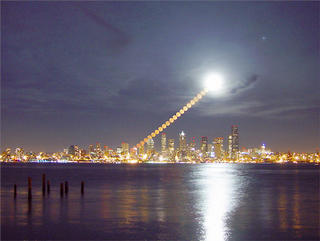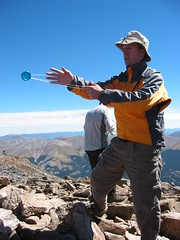
Moonrise over Seattle. Notice how the moon is the same size regardless of position when captured on film.
I find the moon illusion to be fascinating. I'm not sure I can adequately explain why, but let me try. First, it is a universally experienced phenomenon. Frequently one will hear somebody exclaim in awe, "Look how big the moon is!" There seems to be some evidence that different people experience it to different degrees, but everyone experiences it. It's impossible to measure objectively because it's a pure perceptual phenomenon, which brings me to reason number two.
There are as many theories for what causes the moon illusion as there are people studying it. Some claim to be the final answer on the debate but are actually pretty bizarre. The best roundup of explanations I've seen is here, even though I don't agree with some of the analysis.
The third reason is that the correct explanation for the moon illusion seems to be some combination of optics, biology, and psychology. There is no widely accepted correct explanation for the moon illusion, but any seemingly simple problem that requires such disparate disciplines to contribute to a possible solution is inherently fascinating.
Last night was a full moon. We watched it come up over the horizon as we were winding down from our monday night volleyball session. I suggested to everybody that we try the experiment offered on the earlier link, namely
The moon illusion disappears (for most people) when they bend down and look at the moon between their legs. [Is it merely coincidence that this is the position used for "mooning"? Disregard that.] Or, if so inclined, one can view the moon by hanging from one's heels! At least two hypotheses have been proposed to account for this. (1) Familiar objects in the field of view may become useless as distance references because of their unfamiliar appearance when viewed upside-down. (2) The illusion may have something to do with our inner-ear's balance mechanism that tells us whether the head is upright or upside-down.
So there we all were, bending over, "mooning" the moon to look at it upside down through our legs, and it absolutely, positively works. Stand there and look at the moon on the horizon and it looks huge. Bend over and look at it through your legs and it looks tiny. If you have a good theory for why this works, I'd like to hear it. My personal theory is that the mind is less adept at interpreting visual cues when veiwing the world upside down, and thus you get a more raw "unprocessed" version of what the eye sees. The mind is so good at processing visual information and recognizing patterns that we have to trick it into not doing it in order to get a more objective view of the world around us.
What do you think?
Update (20 October): My friend asked a psychology instructor at CU, Joe Berta, about his take on the "mooning the moon" experiment, and this was his response:
This is an old test of one explanation for the moon illusion. Some
researchers have proposed that the moon illusion is affected by the relation of the angle of the eyes relative to the head relative to the moon. So, by changing this relationship the illusion can be changed. However, most perceptual researchers don't believe this theory.
The most convincing explanation is that the moon on the horizon is perceived by our brain to be further away than it is when higher in the sky. Since the moon is actually the same size on our retina, the brain figures it must be bigger and we see it as bigger. The horizon acts as cues to depth. So, maybe, by putting our heads upside down we are eliminating normal cues to depth perception.
The explanation(s) of the moon illusion, however, is far from settled. Put "moon illusion" into google and you will find an amazing number of explanations and criticisms of other explanations.

3 comments:
by Emily Dickinson
The moon was but a chin of gold
A night or two ago,
And now she turns her perfect face
Upon the world below.
Her forehead is of amplest blond;
Her cheek like beryl stone;
Her eye unto the summer dew
The likest I have known.
Her lips of amber never part;
But what must be the smile
Upon her friend she could bestow
Were such her silver will!
And what a privilege to be
But the remotest star!
For certainly her way might pass
Beside your twinkling door.
Her bonnet is the firmament,
The universe her shoe,
The stars the trinkets at her belt,
Her dimities of blue.
Hey diddle diddle,
The cat and the fiddle,
The cow jumped over the moon;
The little dog laughed to see such sport,
And the dish ran away with the spoon.
"We choose to go to the moon,
We choose to go to the moon in this decade and do the other things,
not because they are easy, but BECAUSE THEY ARE HARD!" - JFK
Post a Comment